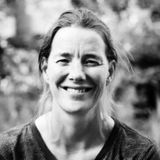More and more cities worldwide embrace the concept of donut economics, in order to meet the needs of people without overshooting Earth’s ecological ceiling. The spiritual mother of the donut – British economist Kate Raworth – puts forward distributed design as one of the core principles of the donut.
We have launched an open call for distributed and regenerative design to get to know the talents who put this at the forefront of their design. On the evening of November 4th, an international group of designers will present their work or project and share their vision on the emerging field of regenerative and distributed design. From edible packs to tables from seaweeds farm, how do designers work on locally produced, but globally connected cities while they focus on giving back to nature and society?









Cities are potential engines of the transition toward a Donut economy. The City of Amsterdam is one of the early adopters of the donut economy concept at the city level. For our series Regenerative and Distributed Design , we launched a call in September 2022. Selected participants and designers will join this program to look at the challenges, and showcase their possible solutions through their designs. In this article, we introduce you a bit more to some of the creative talents and initiatives making an impact!
About the speakers
Pepijn Duijvestein (Amsterdam) has behaved entrepreneurially in the new economy for years. He has initiated many of his own projects and initiatives such as Ship Aphrodite , and the building of his own energy-neutral houseboat, constantly questioning himself on trade-offs between circular and biobased materials. During his role as treasurer within the CPO (collective self-build) project Schoonschip he and other members started the thoughts and conversations about new ownership models for the built environment. Pepijn is proud that his energetic and pioneering attitude is rewarded by prize-winning projects in the new economy such as the Circular Award Public 2020 for the Circular Wood Chainsproject and Schoonschip. Pepijn is currently working on TJIKKO the upside club, Amsterdams first regenerative shop window in which designers and makers can display their regenerative products or ideas. It is an open platform geared towards inspiring the neighborhood to make more sustainable choices.
Marije Remigius is the owner of consultancy company Circu Leren and sustainability manager at Fiction Factory. With these activities she is transforming the way interiors are designed and built. She collaborates with her clients and other stakeholders to take responsibility for the materials used in their products and interiors and how responsability is taken to close the circle. Being open about her approach and sharing research results she hopes it will inpire others to do the same.
Nuri Tayfun Yalcin design, Towards Nature Permaculture is about a new form of Volkstuin design. Expanding the productivity, community building, education, childcare, diversity and edible landscaping in the form of leasure. It is about creating a newly designed, ring of Volkstuinen around Amsterdam.
Angelina Kumar design, Lucrative Dumpster Dives is a foundation that enacts its mission to transform the art and cultural sectors into circular and sustainable ones. They do this to create long lasting social impact and a better world now and for the generations to come.
Kathryn Larsen design, [Seaweed] Farm to Table creates an open source material archive for biomaterials from marine materials such as excess seaweed, shell waste and seagrass, and proposes how to use them in architecture.
Naama Nicotra design, NakedPak series is a line of zero-waste, edible meals, wrapped in soluble bio-plastic made of agar produced from algae.
The series includes vegetable soup, spaghetti with tomato sauce, rice with green Thai curry, lasagna, and ice cream.
pjorkkala design, Dodola is a ceramic water filter for places where the public water supply isn’t adequate or available.
Fien Dekker design in Rain(a)Way design studio, Park Positive is a total concept, a building block: paving including the foundation, that has water storage available for green and restores the soil fertility. This will change the way how we will design our paved cities.
Blade Made reuses decommissioned wind turbine blades to make urban furniture, playgrounds, sound barriers and more. The material is hard to recycle and very durable, making it a perfect fit for beautiful outdoor installations.
With a biodigester in the Green Hub we can process 50 kilo’s of food waste per day, producing 15 cubic meters of methane and 50 liters of liquid compost or bio water. The benefits of the green gas will be distributed amongst everyone delivering the swill (the school, restaurants, community centre and the Green Hub).







